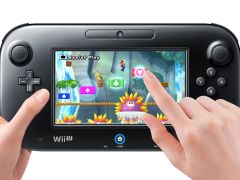Video Gamer is reader-supported. When you buy through links on our site, we may earn an affiliate commission. Prices subject to change. Learn more
Any way you look at it, the Wii U hasn’t sold very well. At all. If I went onto the street and started, say, selling bits of food that I’d picked out of my beard during a long and painful deadline, I believe I’d shift more units than Nintendo has this quarter. There’s a strong chance that if you had two unwanted Wii Us in a certain territory and sold them to a mate, you as an individual have sold more Wii Us than Nintendo. It’s not good.
Despite the numbers being a worry, there are some out there who staunchly believe that everything is fine, and then there are those that think everything is f**ked. (The argument is encapsulated by this exchange in The Big Lebowski).
Both are right and wrong in equal measure. It’s important to distinguish Nintendo from the Wii U. The big N will be fine, for now, no matter what happens to its latest console. Thanks to the success of the original Wii, along with the ever-increasing state of its handheld division, it’s got enough money to release sixty-five Saturn-style bombs and laugh, before going back and inside and stroking the 3DS.
That aside, Nintendo also turned a profit this quarter, no matter how little. The company isn’t hemorrhaging cash, and it could probably just throttle the console now and say, ‘Well, shucks. These things happen.’ This isn’t Dreamcast 2.0. No farms are being bet on Wii U.
The problem – in the short term – is one of perception. Wii U is a good console, with good games. Although it too suffered in terms of actually being played, Ubisoft’s ZombiU is held in very good regard. It’s the age-old problem though: it doesn’t have enough of these highlights and is now locked into more of a vicious cycle than non-doped Tour de France riders. People don’t want to buy it because there are no games, and publishers don’t want to support it because there are no players.
EA’s Peter Moore has been especially vocal about this issue, describing the Wii U as “[feeling] like an offline experience right now”, and questioning whether or not it’s worth the firm’s time and money keeping the servers on. Others may not be as outspoken, but there are probably a fair few other CEOs and execs thinking the same thing. Moore just happened to speak up.
Nintendo’s trump card, of course, is that it has the keys to the Mushroom Kingdom where first party is concerned. Mario, Donkey Kong, Zelda… All that noise has ridden to the rescue before and has done so on countless occasions. The question is whether this can happen again, and if so, it’s not what happens to Nintendo this generation, but what happens next.
/https://oimg.videogamer.com/images/f95d/mario_kart_81.jpg)
The 3DS is commonly cited as an example of how Nintendo has climbed out of a hole before, and fair enough – after a less than stellar first few months, quality software and a price drop turned things around. But the problem with that comparison is that the 3DS was competing with, what, the Vita? iOS? It’s a different type of challenge to that of the home space.
Adversity isn’t something the company is a stranger to, but whereas Nintendo has suffered high-profile reverses with GameCube and N64, it hasn’t really faced anything like this before. The simple fact is that, even with games like Mario and Donkey Kong coming out this year – games you would think would flog a few consoles over the Christmas period – Nintendo is facing a holiday season dominated by new consoles.
The Japanese company might think it’s not really competing with Sony and Nintendo, and horsepower hasn’t been a concern for Nintendo for years, but it’s not just that these machines can push more pixels. It’s that they will dominate the minds – if not the hearts – of a huge swathe of gamers.
Yes, they’ll be more expensive and their libraries may not be the best, but there’s no underestimating the appeal of something that’s new. Nintendo needs to push some serious units if the Wii U is going to continue to be anything other than the Nintendo First-Party Box, but it’s difficult to see how it’s going to do that with four other consoles on the scene (including the last generation units, which will probably be cheaper than air by this Christmas).
Is the Wii U dead? No. Is it well on its way to being buried six feet under? It could be. Will Nintendo do everything it can to stop that from happening? Of course. The struggle, however, is that the firm is caught between generations, and without a strong enough gimmick or head start to keep it ahead. Or, as a system, maybe afloat.
